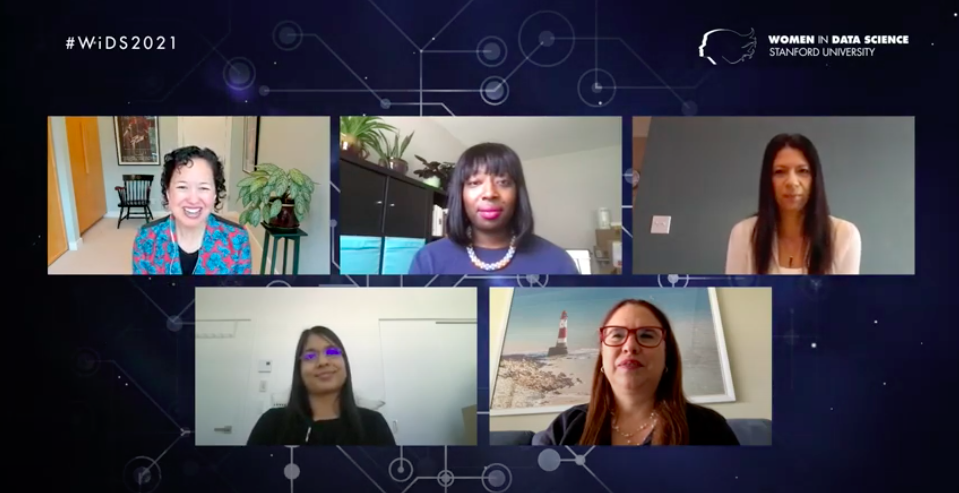- Afua Bruce, Chief Program Officer, DataKind
- Daniela Braga, Founder and CEO, DefinedCrowd
- Aishwarya Agrawal, Professor, University of Montreal; Research Scientist, DeepMind
- Michelle Rodriguez, Dean, Engineering School Universidad del Pacífico
Conference attendees posed more questions to the panel that could be answered during the event. Martina took the time to answer those questions, providing sage advice that we are now sharing with you.
Do you have any advice on reaching out to people (strangers) for informational meetings and how to best uncover information that you would not otherwise know to ask about explicitly?
LinkedIn and social media let you do a lot of “social hacking” and direct, cold outreach. See what they tweet about, where they have gone to school and/or if they have bio pages for panels or talks they’ve given. Take the time to show you’ve done the work to get to know them a little so they know you’re reaching out because you really know them and have engaged with them as a human.
Here’s a great example:
 What Made this Good
What Made this Good
- She clearly read my bio–in depth–which showed me a lot of initiative and went into very specific details to show we have shared interests.
- Not everyone has a bio page, but especially if you are targeting senior executives in companies, there is bio information about them not on their LinkedIn but visible on the Interwebs/social networks. Find it and show you bothered to learn about them. Make connections explicit.
- Transparency establishes trust. She showed why I hit her radar and is above board that she has an agenda. Look at her last paragraph.
- Authenticity. “Regardless, hope we can connect here” lets me feel like I can connect with her even if I’m not interested in what she’s selling. But of course, with this custom a pitch, I told her I’d give her the time.
Any recommendations on how to find mentorship in Data Science space and what to look for in mentors? How would you recommend someone in an environment where there is very little mentorship find those opportunities?
It’s always easiest to find mentorship in your immediate organization or institution. Then you have to know what you want out of it before asking someone to be a mentor–is it periodic career advice? You want to advance more in your role but don’t know how to navigate the politics? You need functional/skills training but don’t feel comfortable getting it from your immediate group? And make your ask specific.
If you’re not finding anyone who you think might be an effective mentor anywhere close to your orbit, don’t hesitate to do cold outreach to people who you think are doing amazing data science who you hear about through webinars or podcasts. Ask peers what they listen to and learn for inspiration. Attend conferences, panels and talks to hear other stories, get inspired and find people who you want to learn from. Interesting people talk about data science in all sorts of channels and places.
How do we get past being stuck in a position where we aren’t being noticed and are being stalled in making progress?
It’s important to be unafraid to have a direct and candid conversation with your manager about this. Do they see you as stuck or stalled? Are they noticing you? You can’t overcome this if you don’t have your direct manager as one of your biggest advocates–certainly as a supporter. But they also look for who within your organization who has great credibility and sway and if they recognize your potential and progress, see if/how they can advocate on your behalf. My greatest career advocate was someone who was never my direct manager. He recognized my potential, was willing to meet with me as a mentor, and when it came to reviews, he always championed my work and advancement far more than my direct managers. But his voice mattered more because he had more organizational influence than my managers did. Find someone like that if your manager isn’t that person.
What are the challenges that propelled your career?
Admitting failure. It took me a decade of thinking I needed to be too good to fail to realize that failure is actually an important part of succeeding and maturing. If you’re not willing to fail or trying something that pushes an edge, you won’t grow.
Learning how to give and take feedback well. Earlier in my career, it was easy to feel defensive whenever I heard feedback I didn’t agree with. So much of success is acknowledging that others’ reality–while it might not be yours–is their experience, regardless of intentions. Learning how to lean into tough feedback and ask questions on where experiences differ for the same situation makes a big difference in making you someone people want to work with.
Being open. This was very counter-intuitive to me when I started my career. I never could have designed the career path I wound up on. I made decisions not by their obvious path to what was next but by what felt good in my heart and maximized learning. It ensured regardless of the outcome, I felt happy in my choices.


